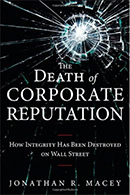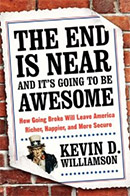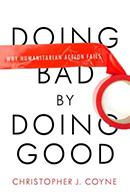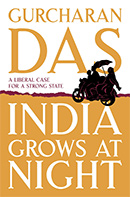|
|
|
|
May 22, 2013 4:30PM
Featuring the author Jonathan Macey, Yale Law School and Yale School of Management; with comments by Damon Silvers, AFL-CIO; and Harvey Pitt, Kalorama Partners, Former Chairman, U.S. Securities and Exchange Commission. Moderated by Mark Calabria, Director of Financial Regulation Studies, Cato Institute.
 Trust and reputation are central to the operation of capital markets. But in our generation, reputational mechanisms are failing; and when they fail, markets and societies are also at risk of failure. The usual response has been to call for more aggressive regulation, yet this only worsens the problem, as Jonathan Macey shows in his new book. There, he demonstrates how and why poorly considered regulation has undermined traditional trust mechanisms throughout financial institutions, credit rating agencies, and accounting and law firms. Please join us for a discussion of these issues, including a better path to restoring trust and integrity. Trust and reputation are central to the operation of capital markets. But in our generation, reputational mechanisms are failing; and when they fail, markets and societies are also at risk of failure. The usual response has been to call for more aggressive regulation, yet this only worsens the problem, as Jonathan Macey shows in his new book. There, he demonstrates how and why poorly considered regulation has undermined traditional trust mechanisms throughout financial institutions, credit rating agencies, and accounting and law firms. Please join us for a discussion of these issues, including a better path to restoring trust and integrity.
|
|
May 23, 2013 12:00PM
Featuring Kevin D. Williamson, National Review. With comments by Michael Tanner, Cato Institute.
 In his new book, The End Is Near and It’s Going to Be Awesome, Kevin D. Williamson examines the crisis of the modern welfare state and demonstrates that the crucial political failures of our time, from education to health care, are the direct result of government monopolies providing and regulating these services. Entitlement programs have promised far more than they can deliver, and slow moving bureaucracies have stifled innovation and efficiency in attempts to deliver on these failed promises. There is, however, a light at the end of the tunnel, as millions of Americans reject the status quo and turn to their own ingenuity to create successful market-derived alternatives to these government monopolies. Please join Kevin Williamson and Cato Institute senior fellow Michael Tanner for an examination of the current state of U.S. entitlement programs and a lively discussion of how the free-market responds when the government fails. In his new book, The End Is Near and It’s Going to Be Awesome, Kevin D. Williamson examines the crisis of the modern welfare state and demonstrates that the crucial political failures of our time, from education to health care, are the direct result of government monopolies providing and regulating these services. Entitlement programs have promised far more than they can deliver, and slow moving bureaucracies have stifled innovation and efficiency in attempts to deliver on these failed promises. There is, however, a light at the end of the tunnel, as millions of Americans reject the status quo and turn to their own ingenuity to create successful market-derived alternatives to these government monopolies. Please join Kevin Williamson and Cato Institute senior fellow Michael Tanner for an examination of the current state of U.S. entitlement programs and a lively discussion of how the free-market responds when the government fails.
|
|
June 4, 2013 12:00PM
Featuring Alan Gura, Gura & Possessky, Lead Counsel, District of Columbia v. Heller; Robert Levy, Chairman, Cato Institute, Co-counsel, District of Columbia v. Heller; Clark Neily, Senior Attorney, Institute for Justice, Co-counsel, District of Columbia v. Heller; and Emily Miller, Senior Editor, Washington Times, Author, Emily Gets Her Gun (forthcoming, Regnery); moderated by Tim Lynch, Director, Project on Criminal Justice, Cato Institute.
Five years ago, the Supreme Court issued its landmark decision in District of Columbia v. Heller. By a 5-4 vote, the Court ruled that the strict gun-control laws in the nation’s capital—which amounted to a complete ban on any usable weapon for self-protection, even in the home—were unconstitutional. The Court finally confronted a long-simmering controversy over the scope of the Second Amendment and declared that, yes, that amendment does secure an individual the right to keep and bear arms. Now, five years later, with gun controls being debated both in the Congress and state legislatures, it is a good time to assess the impact of the Heller precedent. Please join us for a wide-ranging discussion of the Second Amendment, self-defense, and the right to keep and bear arms.
|
|
June 4, 2013 2:00PM
Featuring Jon Entine, Founding Director, Genetic Literacy Project; and Kevin M. Folta, Interim Chair, Horticultural Sciences Department, University of Florida vs. Jeffrey Smith, Author, Producer, Genetic Roulette; and via Skype, Gilles-Eric Seralini, President, Committee for Research and Independent Information on Genetic Engineering. Moderated by Kyle Gibson, Executive Producer, Women in the World Summit.
Despite increasing population, global food production per capita is at all-time highs, even as the amount of agricultural land is reaching new lows. The prime driver has been technology, beginning with the Green Revolution of the 1960s, when Norman Borlaug discovered the key to high-yielding wheat. Since then, “slow†genetics has been replaced by DNA-splicing, giving rise to fears of genetic “mistakes†damaging the world food supply or resulting in inadvertent harm to consumers. Jon Entine and Anastasia Bodnar embrace these innovations, promoting genetic literacy and post-modern agriculture, while Jeffrey Smith and Gilles-Eric Seralini are two of the most prominent opponents to what they believe is a Brave New World of agriculture.
Join us at Cato for the debate on the future of what we eat and how we feed ourselves. Our format includes an hour of formal debate, followed by a break and then questions selected from the audience.
|
|
June 5, 2013 12:00PM
Featuring the author Christopher J. Coyne, F. A. Harper Professor of Economics, George Mason University; with comments by M. Peter McPherson, Former Administrator, U.S. Agency for International Development, 1981–1987; and Elizabeth Ferris, Co-Director, Brookings-LSE Project on Internal Displacement. Moderated by Malou Innocent, Foreign Policy Analyst, Cato Institute.
 A common argument for intervening abroad is to alleviate potential or existing human suffering. Repeatedly, however, state-led humanitarian efforts have failed miserably. Why do well-funded, expertly staffed, and well-intentioned humanitarian actions often fall short of achieving their desired outcomes, leaving some of the people they intended to help worse off? In his new book, Doing Bad by Doing Good: Why Humanitarian Action Fails, Coyne examines the limits of short-term humanitarian aid and long-term development assistance, the disconnect between intentions and reality, and why economic freedom—protection of property rights, private means of production, and free trade of labor and goods—provides the best means for minimizing human suffering. Join us as experts discuss this hotly debated topic. A common argument for intervening abroad is to alleviate potential or existing human suffering. Repeatedly, however, state-led humanitarian efforts have failed miserably. Why do well-funded, expertly staffed, and well-intentioned humanitarian actions often fall short of achieving their desired outcomes, leaving some of the people they intended to help worse off? In his new book, Doing Bad by Doing Good: Why Humanitarian Action Fails, Coyne examines the limits of short-term humanitarian aid and long-term development assistance, the disconnect between intentions and reality, and why economic freedom—protection of property rights, private means of production, and free trade of labor and goods—provides the best means for minimizing human suffering. Join us as experts discuss this hotly debated topic.
|
|
June 5, 2013 4:00PM
Featuring Simeon Djankov, Former Deputy Prime Minister and Finance Minister, Bulgaria, Creator and former lead author of Doing Business (World Bank); and Anders Aslund, Senior Fellow, Peterson Institute for International Economics; moderated by Ian Vasquez, Director, Center for Global Liberty and Prosperity, Cato Institute.
Top officials in the U.S. government, the International Monetary Fund, and the European Union blame Europe’s ills on fiscal austerity and advise Europeans to pursue stimulus spending or delay spending cuts. Simeon Djankov and Anders Aslund will show how the evidence counters that prevailing view. Countries that have reined in their spending are growing briskly while the profligate founder. Aslund will discuss why the level of debt and access to international markets still matter to responsible fiscal policy; Djankov will explain why Europe badly needs a growth plan that includes reducing the burden of regulation. Both speakers will explain why Europeans should focus on policy reform rather than devaluation or exit from the Euro.
|
|
June 6, 2013 1:15PM - 5:00PM
June 7, 2013 8:00AM - 12:00PM
Featuring Jeffrey Miron, Harvard University and Cato Institute; Paul Willen, Federal Reserve Bank of Boston; Ross Levine, University of California, Berkeley; Yona Rubinstein, London School of Economics; James Hamilton, University of California, San Diego; Giovanni Peri, University of California, Davis; and Chad Sparber, Colgate University.
The Cato Papers on Public Policy is a volume of innovative articles by recognized national experts on contemporary economic and public policy issues–with a particular focus on critically evaluating the limits of government policies. In conjunction with the volume’s creation, which will be published in November, the papers are initially presented and discussed at a public conference by the authors, a distinguished group of discussants, invited academics from around the country, local economists from government and think tanks, and members of the public. The topics that will be discussed at this year’s Conference include:
-
Evaluating the "crisis consensus," a slate of policies designed to prevent foreclosures and the accompanying losses to investors and homeowners.
-
Analyzing how a more competitive U.S. financial system influences the economic opportunities of families and the decisions regarding the education of children.
-
Examining the growth of federal liabilities, which are often not included in popularly reported numbers when assessing the gross federal U.S. debt.
-
The effect of the aggregate increase in federal H1B visas on job creation and productivity at the local level.
|
|
June 11, 2013 12:00PM
Featuring the author Gurcharan Das, Former CEO of Procter & Gamble, India; with comments by Swaminathan Aiyar, Research Fellow, Center for Global Liberty and Prosperity, Cato Institute; moderated by Ian Vasquez, Director, Center for Global Liberty and Prosperity, Cato Institute.
 “India grows at night while the government sleeps†is an Indian expression referring to the country’s impressive economic rise despite the presence of a large, burdensome state. Gurcharan Das will explain how India’s story of private success and public failure is not sustainable and that the country’s recent growth slowdown signals the need for a strong liberal state that would ensure accountability, perform limited and well-defined functions, and base itself on the rule of law. Swami Aiyar will discuss contemporary Indian society and the prospects of Das’s proposals. “India grows at night while the government sleeps†is an Indian expression referring to the country’s impressive economic rise despite the presence of a large, burdensome state. Gurcharan Das will explain how India’s story of private success and public failure is not sustainable and that the country’s recent growth slowdown signals the need for a strong liberal state that would ensure accountability, perform limited and well-defined functions, and base itself on the rule of law. Swami Aiyar will discuss contemporary Indian society and the prospects of Das’s proposals.
|
|
July 28, 2013 - August 2, 2013
Washington, D.C.
Cato University is the Cato Institute’s premier educational event of the year. This annual program brings together outstanding faculty and participants from across the country and, often, from around the globe–all sharing a commitment to liberty and learning.
Cato University 2013 will be held at the Cato Institute, located in the heart of Washington, D.C. In a time of political turbulence, ideological posturing, and so much more, our nation’s capital is the perfect setting for examining the roots of our commitment to liberty and limited government and for exploring the ideas and values on which the American republic was founded.
Special Highlights: A dinner with Senator Rand Paul (R-KY), and a special presentation by Cato Institute President John Allison on The Financial Crisis and the Free Market Cure.
Scheduled Speakers Include:
-
Robert Levy, chairman of the Cato Institute;
-
Mary Anastasia O’Grady, Wall Street Journal;
-
Jeffrey Miron, Harvard University and Cato Institute;
-
Robert McDonald, United States Military Academy;
-
and Tom G. Palmer, Cato Institute
For full schedule and a list of speakers, please visit www.cato-university.org.
|
|
|
|
|
|
|